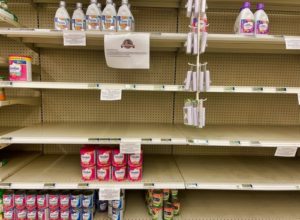
U.S. Sen. Shelley Moore Capito (R-WV) and a dozen of her GOP colleagues want to know why the U.S. Food and Drug Administration (FDA) has not yet approved enough baby formula applications to restore national supplies that could end the current shortage and prevent another one from occurring.
“Despite the numerous flexibilities and resources provided by Congress and temporary import flexibilities,… the infant formula crisis persists nationwide,” wrote Sen. Capito and her colleagues in a Sept. 20 letter sent to FDA Commissioner Dr. Robert Califf.
Among the 12 lawmakers who joined Sen. Capito in signing the letter were U.S. Sens. John Thune (R-SD), Thom Tillis (R-NC), Jerry Moran (R-KS), Roger Wicker (R-MS), Bill Cassidy (R-LA), and Marsha Blackburn (R-TN).
“American families need permanent long-term solutions, and that includes increasing capacity and competition in the U.S. market,” the senators wrote.
Given the delicate nature of the infant formula supply chain — with over 80 percent of the market largely composed of three manufacturers — it’s also more apparent that the nation needs to diversify its commercial capacity by providing other industry manufacturers the opportunity to compete, according to their letter.
“This is especially necessary for manufacturers of infant formula products that cannot be reasonably substituted by currently available products,” Sen. Capito and her colleagues wrote.
Despite the crisis, however, the FDA to date has approved only 23 infant formula products, or base powder, from 10 unique manufacturers out of dozens of ex-U.S.-based formula and milk companies that have applied for short-term FDA approval to provide infant formula to the U.S. marketplace. The last application granted by the FDA for enforcement discretion was August 10, over a month ago, according to their letter.
Sen. Capito and the lawmakers asked Califf to answer several questions about the FDA’s approval process for formula applications, how many applications have not been answered and why, and if applications for specialty formulas had been considered, among others.
“It is unclear why the Center for Food Safety and Applied Nutrition has chosen to ignore so many applications for more manufacturers to market infant formula products for interstate commerce,” wrote the lawmakers.



